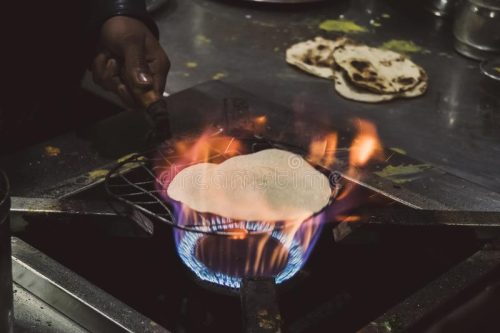
Can cooking roti on direct flame cause cancer? Find here!
As per a recent study published in the journal Environmental Science & Technology, natural gas stoves and cooktops emit such levels of air pollutants like carbon monoxide, nitrogen dioxide, and fine particulate matter that’s considered unsafe by the WHO and are linked to respiratory illness, cardiovascular problems, and cancer along with other health conditions. Not just that, but there was a study published in the journal Nutrition and Cancer, which highlighted the fact that high temperature cooking can produce carcinogenics. Thus, we got thinking about whether it is okay to cook chapatis on direct contact with gas flame or not?
HERE’S WHAT DOCTORS SAY
We talked to a popular Delhi-based Medical Oncologist – Dr Shyam Aggarwal, who is a senior consultant at Sir Ganga Ram Hospital about the correlation between high-temperature cooking and cancer and he said, “We cannot link direct flame cooking with cancer. The carcinogens like heterocyclic amines (HCAs) and polycyclic aromatic hydrocarbons (PAHs) are responsible for altering the DNA of the human body. It is not easy to say if the DNA damage is resulting in cancer as the human body has a natural mechanism to repair itself, and emit such cells. Cancer Genesis results from gene alterations in the cells. So, the chemicals that generate through high-temperature cooking, they have the potential to damage the DNA. Also, if we correlate high-temperature cooking with cancer, then the person should have been consuming such foods for a long duration. Cancer doesn’t happen on few intakes of carcinogens. If a person consumes such foods (high-temperature) regularly, only then the carcinogens enter your body. So, I would say that there is no epidemiological evidence that reflects upon this correlation between high-temperature cooking and cancer. In principal, if there is anything that’s causing DNA alteration, one should avoid that thing.”
Dr Dipanjan Panda, who is a Senior Consultant – Medical Oncology, Indraprastha Apollo Hospitals said, “Carcinogens like heterocyclic amines (HCAs), polycyclic aromatic hydrocarbons (PAHs) and acrylamide are commonly present in starchy foods and meat. There are no strong data on if these chemicals are related to cancer. But, given the data available, we should avoid cooking directly on charcoal. We also did an indicative study that was published in and found out that there is some sort of connection between cooking on ‘open chulha and gallbladder cancer’. So, this study is indicative of the fact that cooking starchy foods and meat on high-temperature has a risk of chemical releases which are pro-carcinogens. But, it is an overstatement to say that cooking roti on direct flame can cause cancer. However, it is better to avoid such cooking procedures.”
COOKING ROTI ON DIRECT FLAME
As per a report published in the year 2011 by the Chief Scientist of Food Standards Australia and New Zealand (FSANZ) Dr Paul Brent, when the bread comes in direct contact with gas flames, it produces a chemical called acrylamide which is produced when sugar and certain amino acids are heated together during the cooking process. Though this report was based on ‘burnt toast’, but wheat flour also contains a certain level of ‘natural sugar and protein’ which when heated together on direct flame can produce the carcinogenic chemical, which is unsafe for human consumption.
SHOULD WE COOK ON TAWA?
On being asked about her take on the chapati being cooked on direct flame, Celebrity Nutritionist Shweta Shah said, “Previously Roti and Chapati were cooked on a tawa by pressing with a cloth. This method was a little time consuming, but it ensured that chapati is cooked at all the ends. Fast forwarding to recent times, Chapatis are cooked directly on the flames. Now, even though this method saves time, but there are few cautions to this method. Sometimes, Roti is not evenly cooked, some parts may burn turning black. Other thing is, as it is directly cooked on the flame, it may attract all the particles stuck on the gas stove. The harmful gases may enter the roti and make it harmful to health. So, why risk it? Switch to your good old tawa and take your sweet time making Chapatis.”
